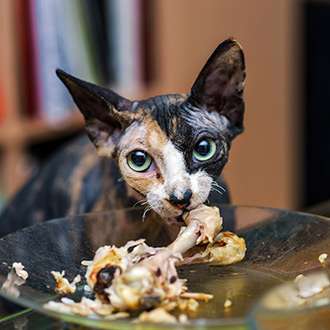Your Cat is a Picky Eater Because of Its Genetic Evolution
 When your cat turns up its nose at a new food, its genes are to blame, say scientists. Two bitter-taste genes evolved very differently for the cat family, who did not develop the natural safeguard humans and other plant eaters need to keep from eating poisonous materials, researchers said.
When your cat turns up its nose at a new food, its genes are to blame, say scientists. Two bitter-taste genes evolved very differently for the cat family, who did not develop the natural safeguard humans and other plant eaters need to keep from eating poisonous materials, researchers said.
“We confront the challenge of ‘finicky cats’ every day. As such, it is exciting to find an unexpected receptor response to bitter compounds that has never been described in the literature to date for any other species,” said Nancy Rawson, a researcher from AFB International, a pet food flavor company, in a statement.
The study, published this week by BMC Neuroscience, analyzed the cat bitter receptors known as Tas2r38 and Tas2r43, as compared with the human counterparts.
Cats were less sensitive to a compound found in the aloe plant called aloin. But they were more sensitive to a chemical called denatonium, which is put in antifreeze to keep children and animals from drinking it. The cat genes didn’t respond at all to some other fundamental bitter tastes, they found.
Overall, the domestic cats had a completely different palate.
READ MORE: Vitamin D Levels Help Predict Survival of Sick Cats
“Feline bitter taste has not been well studied,” said Joseph Rucker, another co-author, from biotechnology company Integral Molecular. “We were surprised to see that one of the cat taste receptors responded to a more limited range of bitter compounds compared to humans, suggesting that cats may be detecting a narrower, or at least a different, repertoire of bitter-tasting compounds.”
The findings were a way to work toward better cat food – and easier ways to administer medications in food to cats, the researchers said.
“Further investigation of the bitter receptor repertoire of large cats, such as lions and tigers, may reveal additional insight into the evolutionary history of this gene family,” they wrote.

